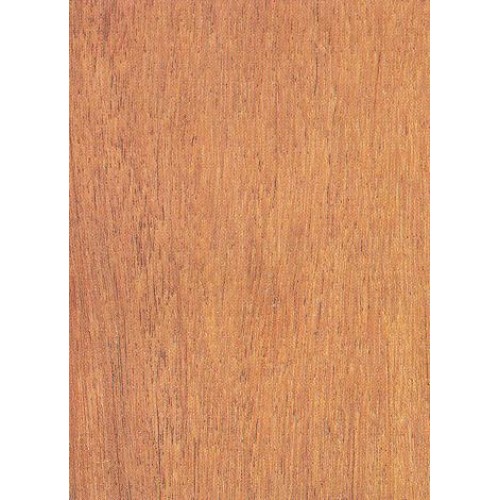Resak Timber Smooth Square Planed 1" (T) x 4" (W) x 2' (L)
Resak Timber Smooth Square Planed 1" (T) x 4" (W) x 2' (L)
- Model: RS-1x4x2
Features
- Species: Resak.
- Material: Hardwood.
- Actual Thickness: ~3/4".
- Actual Width: ~3 5/8".
- Finishing: Smooth square planed.
- Treatment: Untreated.
- Stability: Air drying.
- Subject to stock availability.
Description
Resak - The Standard Malaysian Name for the tree and timber of Cotylelobium spp. and Vatica spp. (Dipterocarpaceae). Vernacular names applied include resak (Peninsular Malaysia, Sabah and Sarawak) with various epithets, balau (Peninsular Malaysia) in error, damar keluang (Pahang), jenuong (Johor) and keruing babi (Peninsular Malaysia). Major species include Cotylelobium lanceolatum, C. melanoxylon; Vatica bella, V. cuspidata, V. flavida, V. havilandii, V. heteroptera, V. lowii, V. maingayi, V. mangachapoi, V. nitens and V. scortechinii. The sapwood is lighter in colour than the heartwood and is sharply defined in Cotylelobium but not generally so in Vatica. The heartwood is pale yellow when fresh and turns to deep red-brown on exposure in Cotylelobium and a fine brown with a green tinge in Vatica.
Also known as Resak (Brunei); Chrama:hs (Cambodia); Vatica (India); Giam, Resak and Resak bukit (Indonesia); Chik dong, Mai ka cha, Mai si and Mai si khao (Laos); Vatica (Papua New Guinea); Narig (Philippines); and Chan Thip, Dam Darng, Khian, Khiem, Kiam, Pan-Cham, See, Tamsao and Yang-nu (Thailand).
Uses
The timber is suitable for all forms of heavy construction, bridges, piling, marine construction, beams, posts, joists, pallets (permanent heavy duty), door and window frames and sills, tool handles (impact), flooring (heavy traffic), power transmission poles, laboratory benches, vehicle bodies (framework and floor boards), railway sleepers, fender supports, staircase (angle blocks, rough brackets, carriage, riser, stringer, tread, bullnose, round end and winder), cooling tower (structural members), telegraphic and power transmission posts and cross arms, heavy duty furniture and wooden containers.
Density
The timber is a Heavy Hardwood with a density of 655-1,155 kg/m3 air dry.
Natural Durability
Graveyard tests on V. cuspidata, a species with an average air dry density of 1,040 kg/m3 indicated that the timber has an average service life of 14 years under natural conditions. The timber is therefore, classified as very durable under Malaysian conditions (Jackson, 1965). Desch (1941) recorded that tests carried out to determine the quality of resak timber indicated that some forms of resak were found to be exceptionally durable (presumably the heavier varieties), ranking with the best forms of balau and giam, and the inferior forms (presumably the lighter varieties) would appear to be at least moderately durable. Burkill (1935) stated that the timber of Cotylelobium is of excellent quality and resistant to Teredo, a type of marine borer. Burgess (1966) however, reported that the timber of Vatica species is not resistant to marine borers and failed within 12 months in Papua New Guinea. In general, resak should not be accepted as resistant to marine borers, but material of Cotylelobium, since it contains silica, is likely to be more resistant than Vatica.
Preservative Treatment
Generally, preservative treatment is not necessary for Malaysian Heavy Hardwoods including the timber of resak. The timber was quoted as very difficult to treat (Lee and Chu, 1974). In general, the heartwood of the hard and heavy forms of resak are expected to be as difficult to treat as other Malaysian Heavy Hardwoods, e.g. balau, chengal and bitis. It is therefore, unlikely that resak will absorb preservatives of any worthwhile quantity except possibly for the sapwood of the lighter species.
Texture
Texture is fine and even, with straight or only shallowly interlocked grain.
Strength Properties
The timber falls into Strength Group B (Engku, 1988b) or SG4 (MS 544: Part 2:2001).
Strength Properties of Resak
| Species | Test Condition | Modulus of Elasticity (MPa) | Modulus of Rupture | Compression Parallel to Grain (MPa) | Compression Perpendicular to Grain (MPa) | Shear Strength (MPa) |
| V. Cuspidata | Green | 18,100 | 105 | 61 | 12 | 13 |
| V. Stapfiana | Green | 14,400 | 81 | 42 | 5 | 9 |
Machining Properties
It is difficult to resaw and cross-cut in Vatica, while Cotylelobium is moderately easy to slightly difficult to resaw. Planing is easy to slightly difficult and the finished surface is smooth.
Machining Properties of Resak
| Species | Test condition | Sawing | Planing | Boring | Turning | ||||
| Resawing | Cross- cutting | Ease of planing | Quality of finish | Ease of boring | Quality of finish | Ease of turning | Quality of finish | ||
| C. malayanum | green | moderately easy | moderately easy | easy | smooth | easy | smooth | - | - |
| air dry | slightly difficult | moderately easy | easy | smooth | easy | smooth | slightly difficult | moderately smooth | |
| V. cuspidata | green | difficult | difficult | slightly difficult | smooth | easy | smooth | - | - |
| air dry | difficult | difficult | slightly difficult | smooth | easy | smooth | slightly difficult | moderately smooth | |
| V. stapfiana | green | difficult | difficult | slightly difficult | smooth | easy | smooth | - | - |
| air dry | difficult | difficult | slightly difficult | smooth | easy | smooth | - | - | |
Air Drying
The timber seasons fairly slowly with very negligible degrade. Only slight cupping, end-checking, splitting and surface-checking are noted during drying. 13 mm thick boards take approximately 3 months to air dry, while 38 mm thick boards take 5 months.
Kiln-Drying
Kiln Schedule B is recommended. Resak, which is hard and heavy as chengal (Neobalanocarpus heimii), needs very slow drying as it is extremely prone to surface-checking. In order to minimise the drying costs and defects, the timber should be air dried to below 30% moisture content before kiln-drying.
Kiln Schedule B
| Moisture Content (%) | Temperature (Dry Bulb) | Temperature (Wet Bulb) | Relative Humidity (%) (approx.) | ||
| ° F | ° C | ° F | ° C | ||
| Green | 105 | 40.5 | 101 | 38.0 | 85 |
| 40 | 105 | 40.5 | 99 | 37.0 | 80 |
| 30 | 110 | 43.5 | 102 | 39.0 | 75 |
| 25 | 115 | 46.0 | 105 | 40.5 | 70 |
| 20 | 130 | 54.5 | 115 | 46.0 | 60 |
| 15 | 140 | 80.0 | 118 | 47.5 | 50 |
Shrinkage
Shrinkage is high, especially in the tangential direction. Radial shrinkage averages 1.5% while tangential shrinkage averages 3.4%.
Defects
The timber is generally free from any major defects except in some logs, which may contain some heart shakes and some accompanying decay. Compression failure is occasionally present in some logs. No ‘pin’ or ‘shot’ hole borer attack in the heartwood has been observed but the sapwood is liable to powder-post beetle attacks. Surface-checking of the timber is common but not severe. Some resin pockets may be present.
Disclaimer
All product images shown are for illustration purposes only. Actual products may varies in term of size, type, brand, version, colour, and other relevant characteristics.

